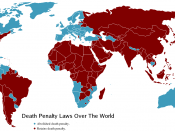At the dawn of the 21st century, the death penalty is considered by most civilized nations as a cruel, inhuman and degrading punishment. It violates the right to life.
It has been abolished by 106 nations, 30 countries have abolished it since 1990. However, the death penalty continues to be commonly applied in other nations. China, the Democratic Republic of Congo, the United States and Iran are the most prolific executioners in the world. Indeed, the United States is one of six countries (including also Iran, Nigeria, Pakistan, Saudi Arabia and Yemen), which executes people who were under 18 years old at the time they committed their crimes.
In the 38 states and federal government that currently have death penalty statutes, five different methods of execution are prescribed: Lethal Injection, Electrocution, Lethal Gas, Firing Squad, and Hanging. The vast majority of jurisdictions provide for execution by lethal injection.
While international documents have restricted and in some cases even banned the death penalty, its application is still not against customary international law.
Much debate continues in the United States as to whether it constitutes an appropriate punishment, at least to the most odious crimes. In recent years, the debate has been further fueled by the use of new technologies, which have shown that a large proportion of people sentenced to death are, indeed, innocent.
The question is: "Should we kill killers?"
Society has always used punishment to discourage would-be criminals from unlawful action. Since society has the highest interest in preventing murder, it should use the strongest punishment available to stop murder, and that is the death penalty. If murderers are sentenced to death and executed, potential murderers will think twice before killing for fear of losing their own life. Finally, the death penalty certainly "deters" the murderer who is...


